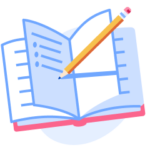Exam season is an important, yet stressful time of year for students. We know the key to doing well is to study, but many of us are not very good at it. The key to having an effective study plan is to do what works for you. If you’re the kind of person who can cram the night before and still do well, keep doing that. However, if you find your current tactics aren’t working, or are just looking for ways to improve your habits, give these five study tips a try.

“Chunking”
No, this has nothing to do with eating a lot of food before your exam. Far too often, students try and study by cramming information. This is understandable since time is in short supply during exam season. The problem is that cramming doesn’t work for most people and yet, almost everyone does it to some degree. Whether you’re the type to study weeks in advance or the night before, chunking will help you remember information.
Chunking is the process of grouping pieces of information together into larger units. Think of a phone number; it’s much easier to remember a chunked number sequence (756-3241) than individual numbers (7-5-6-3-2-4-1). Studies have shown that chunking makes it easier to retain and recall information, even in the short-term. For more information on how chunking leads to successful studying, check out this helpful guide.

Exercise before you study
It may sound absurd but exercising before a study session has a number of benefits. The most important benefit is a boost in energy levels. We’ve all been there: the night before a big test and your eyes just won’t stay open. Many students turn to coffee or energy drinks to wake themselves up but what you should be reaching for are your running shoes. Research has shown that just 15-20 minutes of moderate exercise boosts your energy level and brain function, as well as reduce stress.
Physical activity releases proteins in the brain that can help improve memory and increase cognitive performance. Both of those are pretty important for studying so if you’re looking to ace that exam, try getting active. However, just remember not to overdo it. If your body is telling you to sleep, it’s probably best to hit the pillow instead of the gym.

Speak out loud
If you’re huddled in your room studying quietly, try getting loud. According to a study published by the University of Waterloo, the act of reading and speaking text aloud is a more effective way of remembering information than reading silently. The study notes that speaking and hearing information helps encode memories more strongly. Recording yourself speaking and listening back also proves effective, as researchers found people are more likely to remember information if they hear it from themselves. If you’re going to try studying out loud, just remember not to do it in the library!
Give yourself rewards
There are many tactics you can use to keep yourself motivated while studying. One of the best study tips to keep your eyes on the prize is to set up rewards for yourself. The important thing to keep in mind is that these rewards should be small and not interfere with your study habits. For example, allowing yourself to play a video game for a half hour can turn into multiple hours of procrastinating if you’re not careful. The way to prevent this is to make your rewards small and healthy. By healthy, we don’t mean “reward yourself with a salad”–just that the reward shouldn’t distract you from the task at hand.

Try teaching someone
One of the best ways to test yourself on what you’ve studied is to try and teach the topic to someone. According to a study in Applied Cognitive Psychology, students who teach what they’ve learned show better knowledge retention than those who simply re-read their study notes. Teaching a topic to someone else is a good way of testing how much you truly know. Better yet, you will likely discover gaps in your knowledge. This will point to areas you need to go over before taking an exam.
A great tactic is to pretend you’re teaching someone very young. You will be forced to explain the concept in its most basic form and make sure you are an expert on the core ideas.
For more study tips, including how to use music for stress relief and how to make it through exam season, check out our blog!




